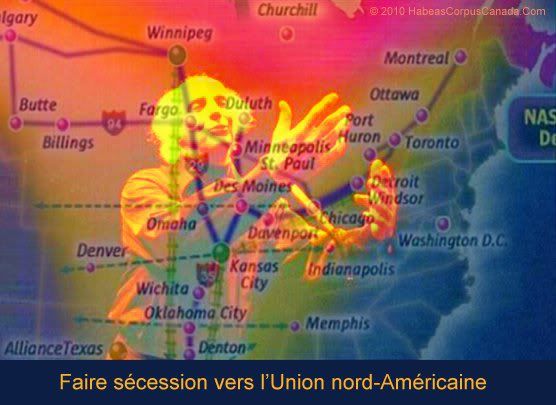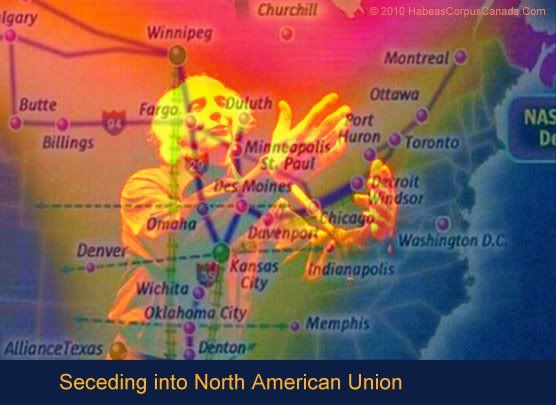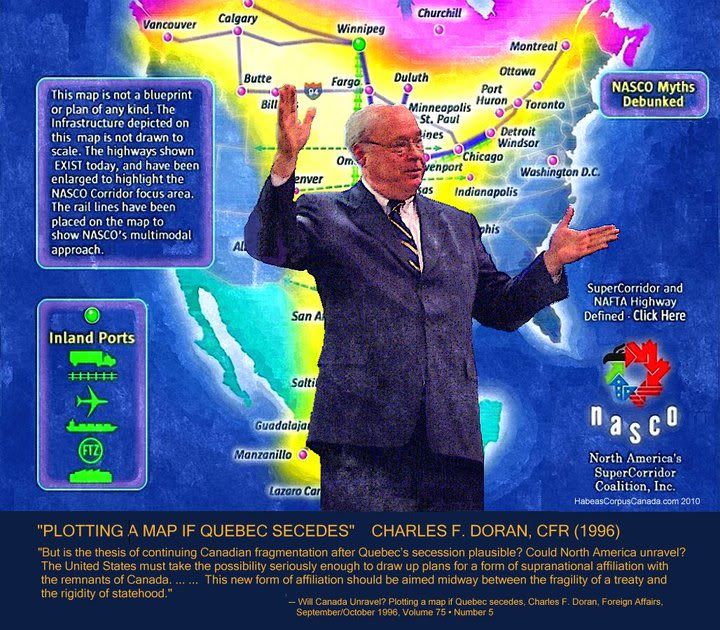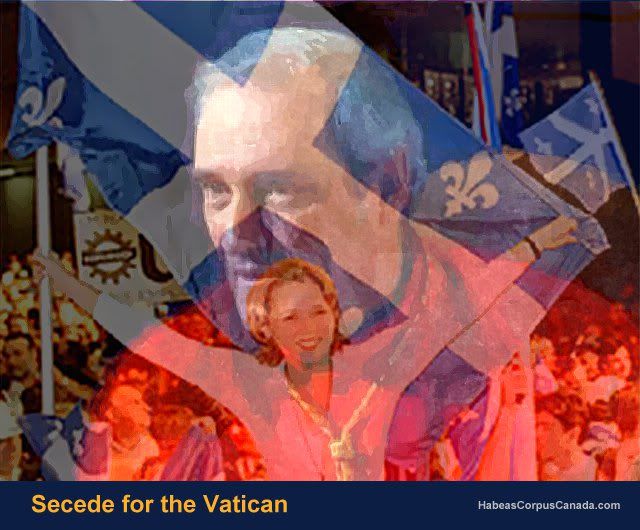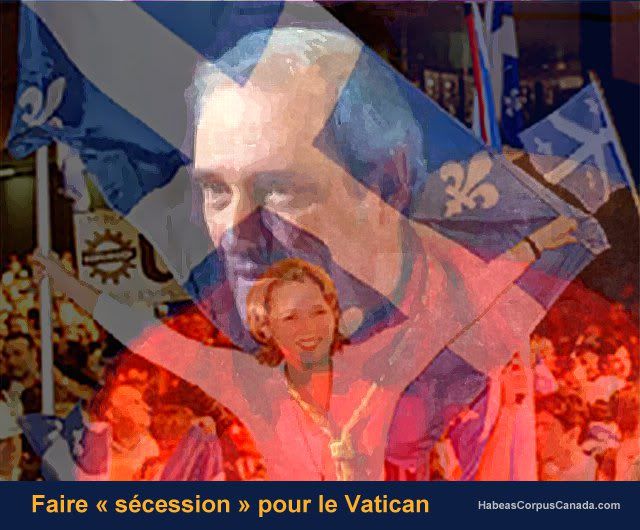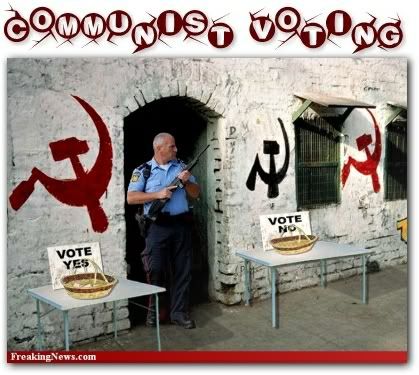
_______________
The "New European Soviet": the European Union is rapidly descending into totalitarianism. Under NAFTA and the proposed FTAA, U.S. policymakers have adopted the same socialist EU program
by Vilius Brazenas | Sept 6, 2004 | The New American
I am going to tell you a story about Europe and America. It is a true story about tyranny and freedom, about hope, folly, deception and betrayal. It is also a warning about grave danger. Alarmed at the trends I see, I feel obliged to tell this story. Now in my 91st year, I am one of the few living souls who have experienced the major events of the last century. Being both European and American, I have witnessed and studied these events from opposite sides of the Atlantic.
I am Lithuanian by birth and saw my small country suffer under both Nazi and Communist brands of totalitarianism. My family was trapped in Russia when the Bolshevik Revolution brought the Communists to power. As a young boy in Moscow, in 1922, I was forced to march with my classmates in the Communist May Day parade in front of Vladimir Lenin himself.
Vilius Bražėnas - Kad tiek kovų nenueitų veltui (1-ma dalis)
VideoLife Uzerinden Izle
[If anyone can understand... I presume this is Lithuanian he's speaking... this is the man, Mr. Vilius Brazenas. There are a number of other videos of him at this source page: http://www.videolife.tk/video/z9r64XbiUm8/Vilius-Bra%C5%BE%C4%97nas-Kad-tiek-kov%C5%B3-nenueit%C5%B3-veltui-1-ma-dalis.html]
Like much of Europe, Lithuania was overrun in the 1940s by the Soviet Red Army, then by the Nazis, and then again by the Soviets. In 1944, as the Soviet Red Army was reinvading Lithuania, and after facing Soviet tanks, I was able to escape with my wife and daughter. In 1949, we were able to come to America and, later, thank God, to become U.S. citizens.
In January 2003 I came back to live in Lithuania. As an author, speaker and newspaper columnist, I am attempting to use my talents and opportunities in the time that I have left to warn my countrymen--both American and Lithuanian--about the very real and present danger to freedom posed by the evolving European Union (EU) and the very similar project proposed for North and South America called the Free Trade Area of the Americas (FTAA).
Most Americans have only a very hazy understanding about what the EU is and an even foggier notion of how it came about. Unfortunately, most Europeans also have a very poor understanding of these things. They have only recently begun to recognize how blind they have been to the very real threats that the growing centralization of power in the EU poses to their national independence and their freedoms.
However, it must be said that the main reason why Europeans and Americans both have such foggy notions about the EU is that the EU architects and promoters have purposely kept the real origins and objectives of the EU shrouded in deception. They had to do this, in order to foist this scheme on the peoples of Europe. If they had openly proclaimed their true objective--to end national sovereignty and create an unaccountable, socialist suprastate--the entire scheme would have been rejected overwhelmingly, right from the start.
When former Soviet dictator Mikhail Gorbachev visited Britain in 2000, he accurately described the European Union as "the new European Soviet." He said this with obvious approval, since he sees the evolving EU as fulfilling his vision of a "common European home" stretching "from the Atlantic to the Urals," as he described it in his 1987 book Perestroika. Mr. Gorbachev is a lifelong Communist overlord who has steadfastly refused to renounce Communism.
In fact, he defiantly remains a Communist. On December 23, 1989, Gorbachev declared to his fellow Soviets, "I am a communist. For some that may be a fantasy. But for me it is my main goal." On February 26, 1991, Gorbachev said, "I am not ashamed to say that I am a communist and adhere to the communist idea, and with this I will leave for the other world." He has repeated these sentiments many times. In his book he also stated: "I frankly admit that we are glad that the idea of a 'common European home' finds understanding among prominent political and public figures of not only Eastern, but also Western Europe...."
It is highly significant that a top-level Marxist-Leninist such as Mikhail Gorbachev could find such affinity with Western leaders about a "common European home" and then, 13 years later, approvingly note that that common home was moving ever closer to the Soviet model. After all, hadn't the Soviet model collapsed and died? But Mr. Gorbachev was, at least in this instance, telling the truth; the EU has been, and is now, moving steadily toward Soviet-style tyranny.
The European Parliament, the European Commission and other EU institutions in Brussels, Strasbourg, Frankfurt and The Hague are dominated by radical socialists and dedicated one-worlders who are bent on smashing the individual, once-independent nation states of Europe into Soviet-style conformity with the oppressive dictates of the new EU Politburo.
A Revolutionary Coup d'Etat
In their powerful expose, The Great Deception: The Secret History of the European Union (2003), British journalist Christopher Booker and Dr. Richard North, formerly a researcher inside the EU bureaucracy, aptly describe the EU as "a slow-motion coup d'etat: the most spectacular coup d'etat in history." In what remains of this article, I will attempt to explain why that description by Mr. Booker and Dr. North is no exaggeration and how this spectacular coup has come about. It is also my intent to show how the deceptive NAFTA-FTAA process is directly related to the EU and patterned after it to achieve the same kind of coup d'etat in the Americas.
The "European project," as the EU designers refer to their ongoing revolution, was launched with the Treaty of Rome in 1957. The Common Market was born the following December when Italy became the sixth nation to ratify the treaty (joining France, Belgium, West Germany, the Netherlands and Luxembourg). It was sold to the peoples of Europe as a "free trade" agreement that would bring prosperity by removing barriers to the movement of people, goods, services and capital across borders.
In fact, it was a program for national suicide, for gradual, "slow-motion" political and economic merger of the member nations. Booker and North write that Belgian Prime Minister Paul-Henri Spaak, known in Europe as "Mr. Socialist," was responsible for convincing his fellow EU founding fathers that "the most effective way to disguise their project's political purpose was to conceal it behind a pretense that it was concerned only with economic co-operation, based on dismantling trade barriers: a 'common market.'"
The Treaty of Rome was, in truth, a constitution for a new government disguised as a treaty. Traditionally, a treaty is an agreement between sovereign states, concerning borders, military alliances, trade relations, extradition, etc. The parties to the treaty remain sovereign states; their form of government is not altered and their citizens are not directly bound with new laws or obligations. The Treaty of Rome, however, created a new, overarching "community" independent of its member states and claiming the power to create laws that are binding not only on the member nations but on their individual citizens as well.
This was not noticed by the people at first, because the EU founders were careful only to show their citizens the benign features of their project. It had been designed to be implemented incrementally, as an ongoing process, so that no single phase of the project would arouse sufficient opposition as to stop or derail it.
The original Treaty of Rome has been repeatedly modified by subsequent treaties and legislation, all of which have greatly enhanced the legislative, executive and judicial powers of the central EU government. The European Communities Act (1972), the Single European Act (1986), the Schengen Agreement (1990), the Maastricht Treaty (1992), the Amsterdam Treaty (1998), and the Treaty of Nice (2000) are some of the most important benchmarks that have transferred vast powers piecemeal to Brussels, where the EU is headquartered.
The eurofederalists cloak this destructive, revolutionary process under such code words as "integration," "harmonization," and "convergence." In 1991, the Single European Act was coming into force and beginning to show the very ugly teeth that had been built into it. At that time, Sir Peregrine Worsthorne of the Sunday Telegraph, one of Britain's major newspapers, expressed in a column the sense of betrayal and outrage felt by many in Europe. "Twenty years ago, when the process began," he wrote, "there was no question of losing sovereignty. That was a lie, or at any rate, a dishonest obfuscation."
It was actually a multitude of lies. The EU founders and their successors have been carrying forward nothing less than a brazen scheme of treason dressed up as economic trade policy. And treason is not too harsh a word, for many of the key leaders of this operation are government officials who are betraying a sacred trust and have been lying outright to their constituents. As Sir Worsthorne pointed out, for decades the EU advocates had explicitly lied, insisting that the developing EU would not affect national sovereignty, and that EU laws and regulations would not override national laws and constitutions. These were wild, paranoid fantasies, they said.
Warnings about the true nature of the EU were routinely smothered by the globalist controlled, pro-EU press--which includes nearly all the major media organs. Now that the project is entering its final stages, however, the eurofederalists are dropping all pretenses and admitting openly what they previously denied. They can hardly help it now, since the EU established a constitutional convention in 2002 to draw up a formal constitution for a United States of Europe. At nearly 300 pages, the document is an open-ended power grab, with none of the checks and balances and means of accountability that we enjoy in our U.S. Constitution.
Many Americans, no doubt, tend to consider the Common Market and the EU as positive steps toward greater freedom. After all, it certainly is more convenient to have only one currency, the euro, when touring the continent. But whatever conveniences it may offer are offset by far more important concerns. Consider:
* Regulatory nightmare. British grocers have been arrested and fined for continuing to sell bananas and other produce by the pound instead of by the EU's newly mandated metric weights. Similarly, the EU dictates on the shape and size of cucumbers, the consistency of marmalade, the texture and taste of chocolate, and thousands of other consumer items.
* Acquis communautaire. The EU already operates under the doctrine of acquis communautaire, which holds that all members must adopt EU law in its entirety, and further, that once the EU usurps the right to legislate in a new area, its authority in that area is guaranteed in perpetuity. Thus, power is guaranteed to flow in one direction--from the member states to the central government.
* Corpus juris. The corpus juris is the new legal code initiated by the Amsterdam Treaty that will, among other things, set up a European Public Prosecutor with overriding criminal law jurisdiction throughout Europe. Habeas corpus, trial by jury and other important protections will be swept away.
* Unlimited migration. Signatory countries of the EU Schengen Agreement have given up their right to police their borders, thus allowing illegal aliens--including terrorists--to travel freely between countries. With Russia and other former Soviet states, along with Turkey, scheduled for membership, we will soon have millions of new migrants, including many Communists and militant Muslims migrating at will throughout Europe--much like what could happen to the U.S. if the FTAA is implemented.
* Economic control. With the establishment of the euro currency and the European Central Bank, the EU countries have lost control of their fiscal and monetary policy as well as their currencies.
* Destroying agriculture. The EU's Common Agriculture Policy (CAP) has taken control of nearly all agriculture and has nearly destroyed British agriculture.
* Power to tax. The EU already claims the authority to dictate indirect tax policies such as the VAT (value added tax) on clothes, food, public transport, fuel, construction, homes, etc. The Treaty of European Union declares that EU decisions to "impose pecuniary obligation on persons other than States shall be enforceable." That means direct taxes on individuals.
* Coercive military and police power. If the Eurocrats have their way, they will soon have European military and police forces to enforce their increasingly dictatorial edicts.
The architects of NAFTA and the FTAA openly cite the EU as the model for their proposed regional "common market" for the Western Hemisphere. For example, Mexican President Vicente Fox acknowledged on May 16, 2002: "Eventually, our long-range objective is to establish ... an ensemble of connections and institutions similar to those created by the European Union." At the time Fox was referring specifically to the three NAFTA countries (the U.S., Canada, and Mexico); the proposed FTAA would further develop the "ensemble of connections" while extending them throughout the Americas.
President Bush, President Fox and the "new world order" Power Elite at the Council on Foreign Relations, Trilateral Commission and Council of the Americas have all adopted the deceptive terminology of the EU--"integration," "harmonization," "convergence"--to describe their "American project." They have adopted an aggressive schedule, intending to do in a few years what it has taken the eurocrats decades to accomplish.
We can and must stop this treasonous plan--or Mr. Gorbachev and his ilk will soon be able to gloat about the "new American Soviet."
________________
________________
Originally published: http://www.thenewamerican.com/index.php/world-mainmenu-26/europe-mainmenu-35/4826-the-qnew-european-sovietq
Re-published: http://findarticles.com/p/articles/mi_m0JZS/is_18_20/ai_n25095870/
UPDATE ON THE AUTHOR:
Few other human beings were eye witnesses to, and participants in, events of the 20th Century as was Vilius Brazenas. A survivor of wars, revolution, plague, famine, foreign military occupations and forced deportations, he became a tireless champion of freedom and unyielding foe of totalitarianism in all its forms. Mr. Brazenas passed away at the age of 97, in a hospital in Vilnius, Lithuania, on October 3 following complications from a recent fall.
"Vilius Brazenas: Lithuanian-American Freedom Fighter Extraordinaire"
The New American, Friday, 08 October 2010 18:00
Written by William F. Jasper
Url: http://www.thenewamerican.com/index.php/world-mainmenu-26/europe-mainmenu-35/4823-vilius-brazenas-lithuanian-american-freedom-fighter-extraordinaire
________________
A light has gone out, but his flame still burns bright in our darkness.
Thank you, Mr. Brazenas.
Kathleen Moore
HABEAS CORPUS CANADA
The Official Legal Challenge
To North American Union
www.habeascorpuscanada.com

